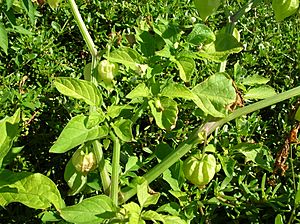Physalis angulata facts for kids
Quick facts for kids Physalis angulata |
|
|---|---|
 |
|
| Cutleaf groundcherry | |
| Scientific classification |
|
| Kingdom: | Plantae |
| Clade: | Tracheophytes |
| Clade: | Angiosperms |
| Clade: | Eudicots |
| Clade: | Asterids |
| Order: | Solanales |
| Family: | Solanaceae |
| Genus: | Physalis |
| Species: |
P. angulata
|
| Binomial name | |
| Physalis angulata |
|
| Script error: The function "autoWithCaption" does not exist. | |
| Synonyms | |
|
|
Script error: No such module "Check for conflicting parameters".
Physalis angulata is a type of plant. It is also known as the cutleaf groundcherry or wild tomato. This plant grows upright and lives for about one year. It belongs to the nightshade family, which also includes tomatoes and potatoes.
This plant grows from seeds. Its leaves are dark green and shaped like an oval. They often have jagged edges, like teeth. The flowers are light yellow and have five sides. The fruit is yellow-orange and grows inside a papery, balloon-like covering. This covering is called a calyx.
Physalis angulata first came from the Americas. Now, you can find it growing naturally in warm, tropical, and subtropical places all over the world.
It is related to the Cape gooseberry. However, it is not the same plant. The Cape gooseberry is a fruit grown in the Andes mountains and sold worldwide.
Contents
What is the Cutleaf Groundcherry?
The cutleaf groundcherry is a plant that grows from a seed each year. It is known for its unique fruit. This fruit grows inside a papery husk, which looks like a small lantern. The plant can grow quite tall and has many branches.
Leaves and Flowers
The leaves of the cutleaf groundcherry are dark green. They are usually oval-shaped. Often, the edges of the leaves look like they have small teeth. This gives them a slightly jagged appearance.
The flowers are small and pale yellow. They have five petals and are shaped like a star. After the flower blooms, it forms a fruit.
The Fruit
The fruit of the cutleaf groundcherry is round and yellow-orange. It is about the size of a small marble. What makes it special is the papery husk that surrounds it. This husk protects the fruit as it grows. It looks like a tiny, inflated balloon.
Is the Plant Safe to Eat?
The fruit of the cutleaf groundcherry is edible. This means you can eat it! People enjoy the fruit raw, cooked, or made into jams. It has a slightly sweet and tangy flavor.
However, it is very important to know that all other parts of the plant are poisonous. This includes the leaves, stems, and roots. Only the ripe fruit is safe to eat. Always be careful and only eat the fruit if you are sure it is from this plant and fully ripe.
Other Names for the Plant
The cutleaf groundcherry has many different names around the world. These names often depend on the language and where the plant grows.
- In English, some common names are: angular winter cherry, balloon cherry, gooseberry, hogweed, and wild tomato.
- In Spanish, it is called bolsa mullaca.
- In Malayalam, people call it njottanjodiyan (ഞൊട്ടാഞൊടിയൻ) or mottaampuli (മൊട്ടാമ്പുളി).
- In Indonesian, it is known as ceplukan or ciplukan.
- In Suriname, its name is batoto wiwiri.
- In Meru, it is called Nkabakabu.
- In Egyptian, it is known as Hrankash (حرنكش).
See also
 In Spanish: Physalis angulata para niños
In Spanish: Physalis angulata para niños
 | James B. Knighten |
 | Azellia White |
 | Willa Brown |

